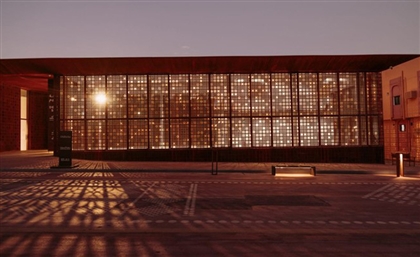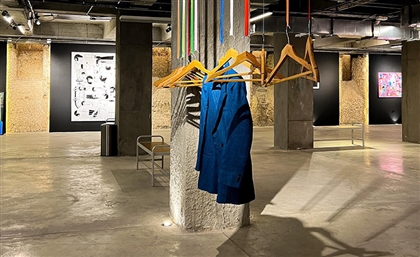Art's Journey with Abdel-Wahab Abdel-Mohsen
Rahma Zein El Din heads to Abdel-Mohsen's native Kafr El Sheikh before his exhibition at the Arts-Mart gallery two years ago, to talk about simplicity of inspiration and his artistic process...
With light flooding into the small art studio propped in the heart of the agricultural town of Kafr El Sheikh we sat drinking koshary tea and watched artist Abdel-Wahab Abdel-Mohsen as he cut into a wooden surface, chatting away about his relationship with art. We meet just days before Transcending Spaces – his robust exhibition – took over Arts-Mart the Gallery two years ago, but he seemed as relaxed as ever.
If I had a penny for all the romantics and intellectuals who have attempted to convey the meaning of art, I would be a very rich woman. Though an exhausted subject, Abdel-Mohsen breathes life into the word as he effortlessly etches away onto a wooden surface and puts things into perspective: "Art is expression." A humble man immersed in his roots and loyal to his art form, he has a clear cut understanding and appreciation for art which resonates in his intricate pieces; he is his art. Be careful where you step in the studio for he also sleeps there, "I need to be around my art. What if I were to decide to wake up in the middle of the night to add something? Destroy it completely, even?”

So, art means different things for different people. Whilst for some it is Kim Kardashian's behind, for Abdel-Wahab it is the purest form of expression; a translation of an emotion, idea or message brought to life. "A smart artist is one who finds a medium that best helps him translate the energy inside him, just as a poet uses words,” he explains. For Abdel-Wahab, woodcutting best helps him articulate his energy, as he toils over the wood before using his intricately cut patterns and shapes to create prints. Here is the interesting part: art for him is not the final piece but the journey, the relationship which develops between him and his medium; the movement of cutting the wood itself is key, as looking at the final piece alone would negate the energy and the action and reaction which developed between him and the wooden surface. His art are not pieces of art but works of art. "When you look at my work you will see my psychology, the soul in the work, my way of life. I enjoy the process itself, building something. The action is important for me; anyone can learn the technique and make a pretty picture but then the work loses its creativity and innovation. It is enjoying the process and looking for relationships and inspiration that makes it come alive.”
Though loyal to woodcutting Abdel-Wahab stresses the need to take oneself out of their comfort zone and take a risk with different materials. As an artist you need this kind of adventure; this brings vitality to your work and helps you develop. The journey of research and developing is one that never ends,” he explains.This is why for Arts-Mart the Gallery’s upcoming exhibition, he will bring in a depiction of his journey and not only showcase his prominent woodcut printmaking, but also paintings and drawings. "Creativity relies on the artist himself, his ideas, his willingness to forget everything he knows and try something new, art is not a beautiful picture, it’s a beautiful expression; a truthful one,” he philosophises.

"I am just a Fallah," Abdel Wahab says proudly, his eyes twinkling as we leave his studio and set off on our way to Beheira; a place that has acted as his muse. "I could never live in Cairo…traffic…this is what I know. I go in the morning to Beheira, watch, observe and eat. I surround myself with nature then head back to my studio and see where my inspiration takes me.” Endless greenery surrounds you and a sense of peace comes over you and it becomes easy to see the environment and mood depicted in his pieces. Oscar Wilde once said that "Nature imitates art," which seems the case for Abdel-Wahab's art. The sunlight hits his cotton white hair and he says that he knows his demeanor causes the people of Kafr El Sheikh to stare but if he were to make a fuss about it he wouldn’t have the time to work on his art, read or live. We get out of the car and breathe in the nature as he talks lovingly about Kafr El Sheikh and nature; "A million artists can sit and draw one leaf and bring out a million different outcomes…Nature is endless and we need to open our eyes and connect with it." He adds that Kafr El Sheikh offers him the ability to live among his inspiration, staying loyal to his roots and indulging in a slow paced, comfortable life. People cross the field to greet him and graciously offer us lunch and tea. He points out their white galabeyas and how they sit comfortably on the dirt, "because nature isn’t dirty, plastic is man-made rubbish."

We continue walking through fields and it made sense how Cairo city dwellers were so very much captivated by his work, because it offered them a peak and an escape into a life that is more serene, natural, filled with vibrancy. That being said he stressed that he does not put in mind an audience when he works; "personally, I don't work for a specific time period or for an audience. My work is true to me and by the way inside of everyone is both something beautiful and very deep." With that he smiles and offered us yet more food before we made our way back to the chaos that is Cairo.
Find out more about Arts-Mart and Transcending Spaces by Abdel-Wahab Abdel-Mohsen here.
Photography by Mahmoud Asfour.
- Previous Article House Obsession: CJC Hands It To The Ladies
- Next Article 11 Port Said Massacre Death Sentences Referred to Mufti
























